The Universe Colludes to Make an Artist: Chiagoziem Nneamaka Orji’s Journey into the World of Arts
By Tochukwu Precious Eze
- 19th February 2024
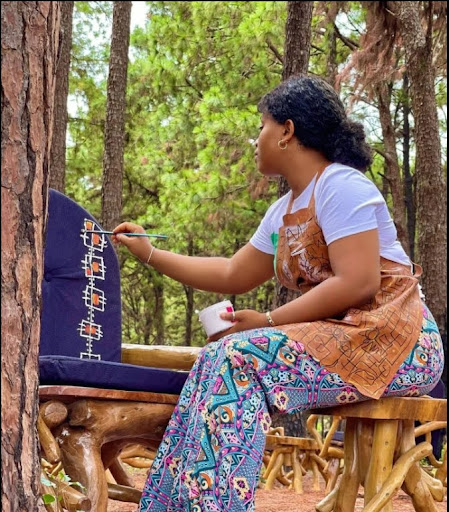
Every culture and time needs its artists― those charged with the noble responsibility of expressing and preserving the thoughts and ways of life of their people through their pieces. Their hands are blessed such that when they create, their work is emotive and felt across borders. Historic works of sculptors, painters, writers, and singers are studied today in a bid to understand the ways and values of our ancestors. It is therefore pertinent to spotlight artists of our time who are carrying this torch and documenting our traditions for future generations.
The young artist, Chiagoziem Nneamaka Orji, who has gained attention for celebrating the Igbo culture and spirituality through her work, lets us in on the inspiring journey that has shaped her life and work.
Chiagoziem grew up in Enugu in what is considered the typical African home, with siblings to play with and parents who shared folklore with them. Yet, even as a child, she was already on this path to becoming an artist. “I was a messy kid, always making a mess here and there, playing around with colours. My father had this library that comprised more of Igbo literature. Curious as we were, we wanted to see what these stories were about. Also, at the time Igbo was still prominent in schools and we read these storybooks about how the tortoise was mischievous and cunning. Those books are not as popular now as they used to be. My elder brother and I would take turns to tell bedtime stories. So, Igbo folklore was the foundation on which I developed my interest in arts and storytelling.”
The role of Chiagoziem’s parents in preparing her for this task cannot be overemphasized. She first notes that she and her siblings were not given any English names, as was popular with children born between the late 90s and early 2000s. While they could not afford to travel to the village as often as they wanted, their parents were conscious about communicating with them in their native dialects as a way to remind them of their home. As the proverb says, “One who does not know where they are coming from will most probably not know where they are headed.” Chiagoziem’s connection and rootedness to her home were instrumental as she set out on her quest to become an artist.
Just about everyone recognized the little girl’s talent as an artist and encouraged her to pursue it. Yet each time she went out, the only artists she saw were by the roadside, displaying their work, hoping to catch a break. This was not the life she imagined for herself. Even though she visited art studios to create and learn now and then, she was also good at science subjects and was already harboring thoughts of becoming a nurse, just like her mother.
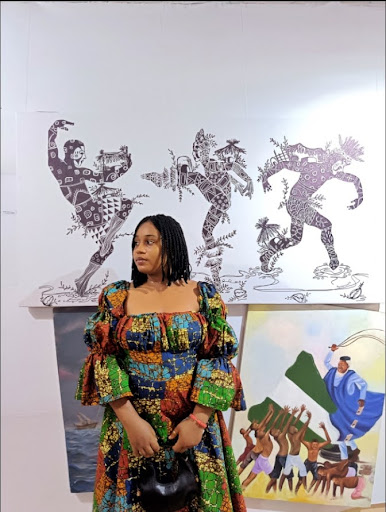 The artists and her works
The artists and her works 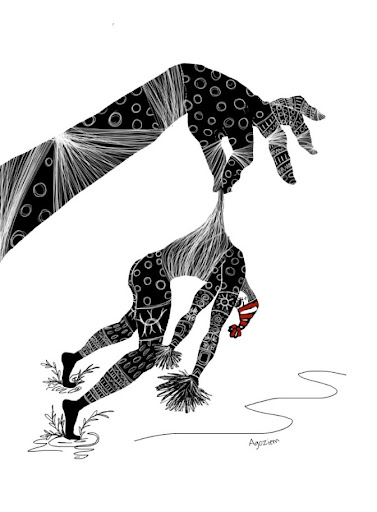 Title: Aka chi-ukwu (God's Hand)
Title: Aka chi-ukwu (God's Hand)Chiagoziem draws inspiration from her identity as an Igbo person. “My family is a somewhat spiritual one, and we were always taught that this physical world will not last; that we are all spirit beings in mortal bodies. This was to teach us not to be too materialistic, and to pursue things that are worthwhile. It made me think a lot about spirituality. As a teenager, I began searching and reading as much as I could, and I eventually realized that everything we do here is connected to the spiritual. This influenced my work. I always say “mmadu bu mmuo: humans are spirits,” and I try to let people know that the spiritual plane will be the only thing left after this physical world is gone. I consider this my first and primary source of inspiration.
“My culture also inspires me a lot. Growing up, being Igbo was fun and intense. I watched my mum every Sunday morning dress in their meeting attire― the headgear, the necklace, the shoes, the print wrappers and the way she spread her legs while tying them to ensure that she could walk in them. Even when we gathered as children to play, it was traditional. There were chants, songs, and patterns that everyone knew. Having experienced this, and seeing that parts of it are lost with time, I try, through my art, to preserve the Igbo experience.”
Nsukka Art School, where Chiagoziem studied, is also called Uli Art School. This was where she learnt about Uli and Nsibidi symbols. While these were not a part of her curriculum, she found them interesting, studied them, and went to studios where they were taught. Today, she infuses these symbols into her art, not just for aesthetic value, but also to add to their depth and meaning.
The talented artist’s love for stories and Igbo literature is reflected in the way her work appears. Every piece tells a story, beginning with the title and extending to every minute detail. Speaking on how it all comes together, Chiagoziem shares that to work, she needs space more than anything else. “I always take time to clean and clear my space. It opens up the portal through which I tap into my creative source. I can listen to music while working but most times, I prefer not to. When I work in silence, it is easier to concentrate, to build these characters and to hear myself while at it. Some of them require some research so I take my time to learn about their stories so I can properly tell them.”
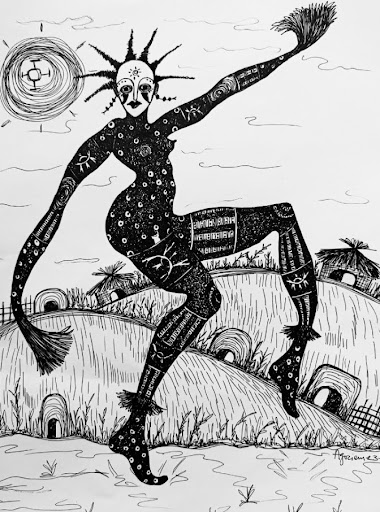 Title: Unlucky but Lucky Azuka
Title: Unlucky but Lucky AzukaReminiscing on the challenges she has faced so far, Chiagoziem highlights that people often approach her with ideas of better versions of her art. Some think her work needs more colour, while others want them to be less frightening. “You will become a depressed artist if you try to satisfy everyone’s needs and demands with your art. Art itself means self-satisfaction. As long as I am satisfying the urge to preserve our authentic heritage, I don’t mind what other people think.
“Yes, there were times when I felt bad but I did not let that break me. I realized that when you do something so rare and different, you will first look like a complete fool. It is not the people’s fault; they do not understand it yet. But as long as it feels right and you can proudly speak about your work, you must carry on. Eventually, you will find your people and they will stay. They will be mind-blown, and it will feel like everything you ever needed. Art is nothing without an audience.”
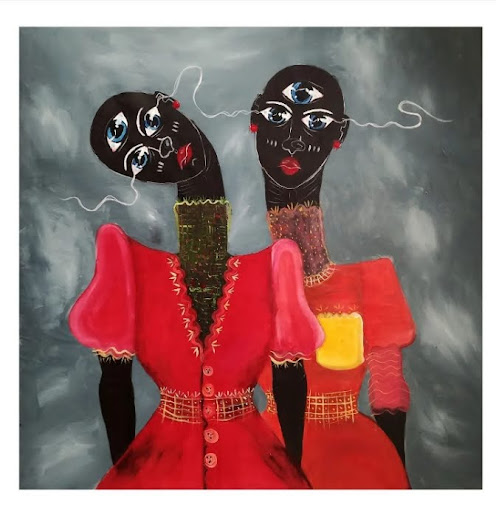 Title: Ada Nne m
Title: Ada Nne m“To say that I have challenges is to appear ungrateful. I am right where I should be at this moment. Everything is working together for me.”